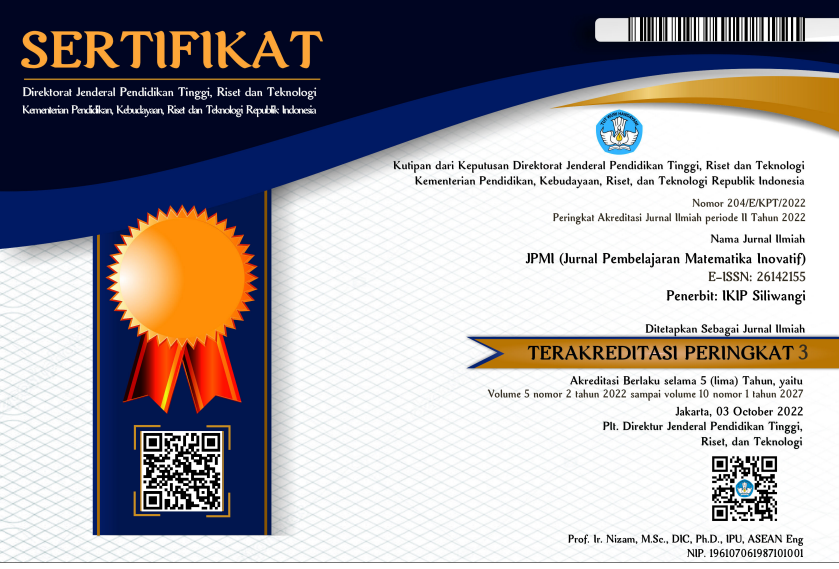Pengaruh gaya kognitif FI-FD dan minat belajar terhadap pemahaman konsep matematika pada materi segitiga dan segiempat
DOI:
https://doi.org/10.22460/jpmi.v6i6.17749Keywords:
Cognitive Style, Interest in Learning , Understanding of conceptsAbstract
The purpose of this study was to determine whether the field dependent-field independent cognitive style and interest in learning partially or simultaneously affect the understanding of mathematical concepts. This type of research is a quantitative study with a population of all class VII SMP Muhammadiyah 4 Kebomas, namely as many as 57 students, a sample of 30 respondents was taken utilizing corresponding arbitrary inspecting strategy. Information assortment procedures are by survey and test. Information examination method utilizing various direct relapse investigation. In light of the aftereffects of the relapse test, the results show that: 1) There is a significant influence of cognitive style and interest in learning simultaneously on the understanding of mathematical concepts. 2) There is a significant influence of cognitive style on the understanding of mathematical concepts. 3) There is a massive impact of interest in learning on the understanding of mathematical concepts. Based on data analysis, it can be interpreted that field dependent-field independent cognitive style and interest in learning partially or simultaneously have a significant effect on the understanding of mathematical concepts.
References
Agung, G. H., & Ardiansyah, A. S. (2023). Telaah model pembelajaran conceptual understanding procedures (CUPs) berbantuan e-LKPD terhadap kemampuan pemecahan masalah. in Prosiding Seminar Nasional Matematika, 6, 360–366. https://journal.unnes.ac.id/sju/index.php/prisma/
Edriani, D., Harmelia, H., & Gumanti, D. (2021). Pengaruh minat dan kemandirian belajar terhadap hasil belajar siswa jurusan akuntansi di SMK negeri 1 painan. Edukatif : Jurnal Ilmu Pendidikan, 3(6), 4506–4517. https://doi.org/10.31004/edukatif.v3i6.1479
Hadi, S., & Umi Kasum, M. (2015). Pemahaman konsep matematika siswa smp melalui penerapan model pembelajaran kooperatif tipe memeriksa berpasangan (Pair Checks). EDU-MAT: Jurnal Pendidikan Matematika, 3(1), 59–66. https://doi.org/10.20527/edumat.v3i1.630
Kafiar, E., Kho, R., & Triwiyono. (2015). Proses berpikir siswa sma dalam memecahkan masalah matematika pada materi SPLTV ditinjau dari gaya kognitif field independentdan field dependent. Jurnal Ilmiah Matematika Dan Pembelajaran, 2(1), 48–63.
Kusumaningsih, W., Saputra, H. A., & Aini, A. N. (2019). Cognitive style and gender differences in a conceptual understanding of mathematics students. Journal of Physics: Conference Series, 1280(4). https://doi.org/10.1088/1742-6596/1280/4/042017
Lestari, I. (2015). Pengaruh waktu belajar dan minat belajar terhadap hasil belajar matematika. Formatif: Jurnal Ilmiah Pendidikan MIPA, 3(2), 115–125. https://doi.org/10.30998/formatif.v3i2.118
Lisnani, L. (2019). Pengaruh penggunaan konteks daun terhadap hasil belajar siswa. Mosharafa: Jurnal Pendidikan Matematika, 8(3), 423–434. https://doi.org/10.31980/mosharafa.v8i3.555
Mirlanda, E. P., & Pujiastuti, H. (2018). Kemampuan penalaran matematis: analisis berdasarkan gaya kognitif siswa. Symmetry: Pasundan Journal of Research in Mathematics Learning and Education, 3, 56–67. https://doi.org/10.23969/symmetry.v3i2.1252
Mukrimaa, S. S., Nurdyansyah, Fahyuni, E. F., Yulia Citra, A., Schulz, N. D., Taniredja, T., Faridli, E. M., & Harmianto, S. (2016). Matematika tingkat lanjut fase F. Jurnal Penelitian Pendidikan Guru Sekolah Dasar, 6(August), 128. https://kurikulum.kemdikbud.go.id/file/cp/dasmen/40. CP Matematika Tingkat Lanjut.pdf
Permatasari, N. D., Nurlaela, S., & Titisari, K. H. (2019). Return on assets , return on equity , earning per share terhadap 2 . Kajian teori Theory Keagenan ( agency theori ). Edunomika, 03(Februari), 90–96.
Pratiwi, N. K. (2017). Pengaruh tingkat pendidikan, perhatian orang tua, dan minat belajar siswa terhadap prestasi belajar bahasa indonesia siswa SMK kesehatan di kota tangerang. Pujangga, 1(2), 31. https://doi.org/10.47313/pujangga.v1i2.320
Rahayu, Y. ; H. P. (2022). Analisis kemampuan penalaran matematis siswa SMP pada materi himpunan. Didactical Mathematics, 4(1), 119–126. https://doi.org/10.31949/dm.v4i1.2040
Rais, H., & Ferinaldi. (2019). Pengaruh minat belajar terhadap pemahaman konsep matematis pada mata kuliah teori bilangan mahasiswa pendidikan matematika. Mat-Edukasia: Jurnal Pendidikan Matematika, 4(1), 71–77.
Sari, L. (2022). Pengaruh minat belajar terhadap kemampuan pemahaman konsep matematis siswa SMP pada materi relasi dan fungsi. Didactical Mathematics, 4(1), 111–118. https://doi.org/10.31949/dm.v4i1.2016
Susandi, A. D., & Widyawati, S. (2017). Proses berpikir dalam memecahkan masalah logika matematika ditinjau dari gaya kognitif field independent dan field dependent. NUMERICAL (Jurnal Matematika Dan Pendidikan Matematika), 1(1), 93. https://doi.org/10.25217/numerical.v1i1.122
Syaiful, S., Aprillya, S., & Anggraeni, E. (2020). Pengaruh strategi pembelajaran everyone is a teacher here (eth) ditinjau dari gaya kognitif terhadap pemahaman konsep matematika. Jurnal Gantang, 5(1), 51–59. https://doi.org/10.31629/jg.v5i1.1562
Wulandari, Y. S., & Muhandar, D. R. (2019). Identifikasi kemampuan pemahaman konsep terhadap gaya kognitif siswa SMP dengan materi kubus dan balok. Prosiding Sesiomadika : Seminar Nasional Matematika Dan Pendidikan Matematika Universitas Singaperbangsa Karawang, 208–227.
Zulnaidi, H., & Zakaria, E. (2012). The effect of using GeoGebra on conceptual and procedural knowledge of high school mathematics students. Asian Social Science, 8(11), 102–106. https://doi.org/10.5539/ass.v8n11p102
Downloads
Published
Issue
Section
License
Copyright (c) 2024 JPMI (Jurnal Pembelajaran Matematika Inovatif)

This work is licensed under a Creative Commons Attribution-ShareAlike 4.0 International License.
The author is responsible for acquiring the permission(s) to reproduce any copyrighted figures, tables, data, or text that are being used in the submitted paper. Authors should note that text quotations of more than 250 words from a published or copyrighted work will require grant of permission from the original publisher to reprint. The written permission letter(s) must be submitted together with the manuscript.
















